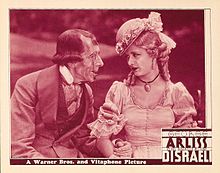
Paul Muni was an American stage and film actor who grew up in Chicago. Muni was a five-time Academy Award nominee, with one win. He started his acting career in the Yiddish theater. During the 1930s, he was considered one of the most prestigious actors at the Warner Bros. studio and was given the rare privilege of choosing which parts he wanted.

Mary Anne Disraeli, 1st Viscountess Beaconsfield was a British peeress and society figure who was the wife of the British statesman Benjamin Disraeli.
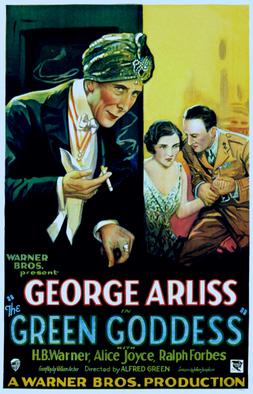
The Green Goddess is a 1930 American pre-Code film directed by Alfred E. Green. It was a remake of the 1923 silent film, which was in turn based on the play of the same name by William Archer. It was produced by Warner Bros. using their new Vitaphone sound system, and adapted by Julien Josephson.
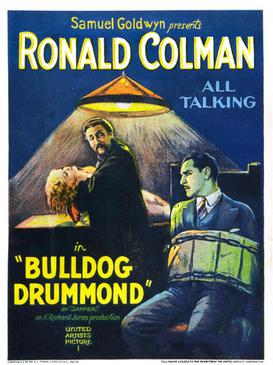
Bulldog Drummond is a 1929 American pre-Code crime film in which Hugh "Bulldog" Drummond helps a beautiful young woman in distress. The film stars Ronald Colman as the title character, Claud Allister, Lawrence Grant, Montagu Love, Wilson Benge, Joan Bennett, and Lilyan Tashman. Produced by Samuel Goldwyn and directed by F. Richard Jones, the movie was adapted by Sidney Howard from the play by H. C. McNeile.

Julien Josephson was an American motion picture screenwriter. His career spanned between 1914 and 1943. He was a native of Roseburg, Oregon.

Glorious Betsy is a 1928 silent film with talking sequences. It is based on the 1908 play of the same name by Rida Johnson Young, and it stars Dolores Costello. It was produced by Warner Bros. and nominated for an Academy Award for Best Writing, Adaptation in 1929. The film was directed by Alan Crosland with cinematography by Hal Mohr. A mute print of this film survives in the Library of Congress, and while the copy is missing some of the sound reels, it's unknown whether other copies of the sound have been preserved elsewhere. Vitaphone track survive incomplete at UCLA Film and Television Archive.

The Man Who Played God is a 1932 American pre-Code drama film produced by Darryl F. Zanuck and directed by John G. Adolfi. George Arliss stars as a concert pianist embittered by the loss of his hearing, who eventually finds redemption by helping others; it also features a then little-known Bette Davis as the much younger woman engaged to the protagonist.

George Arliss was an English actor, author, playwright, and filmmaker who found success in the United States. He was the first British actor to win an Academy Award – which he won for his performance as Victorian-era British prime minister Benjamin Disraeli in Disraeli (1929) – as well as the earliest-born actor to win the honour. He specialized in successful biopics, such as Disraeli, Voltaire (1933), and Cardinal Richelieu (1935), as well as light comedies, which included The Millionaire (1931) and A Successful Calamity (1932).

Suez is an American romantic drama film released on October 28, 1938 by 20th Century Fox, with Darryl F. Zanuck in charge of production, directed by Allan Dwan and starring Tyrone Power, Loretta Young, and Annabella. It is very loosely based on events surrounding the construction, between 1859 and 1869, of the Suez Canal, planned and supervised by French diplomat Ferdinand de Lesseps. The screenplay is so highly fictionalized that, upon the film's release in France, de Lesseps' descendants sued (unsuccessfully) for libel.

Margaret Dale was an American stage and film actress. She performed on Broadway for over fifty years and occasionally did films in the 1920s. She appeared in a large number of Broadway hits over the course of her years as an actress.

My Man is a 1928 black and white part-talkie American comedy-drama musical film directed by Archie Mayo starring Fanny Brice and featuring Guinn "Big Boy" Williams. It was Brice's feature film debut at the age of 37. She was a star in the Ziegfeld Follies before she started acting in motion pictures. At the time Warner Bros. made this film there were still some silent movies in production and being released. My Man used intertitles but included talking sequences, synchronized music, and sound effects using a Vitaphone sound-on-disc system. It was not until 1929 that talking movies would completely take over, but Warner Bros. had completely stopped making silent movies and switched to sound pictures by the end of that year, either part talking or full talking. Warner Bros. also started making movies in color as well as sound movies.
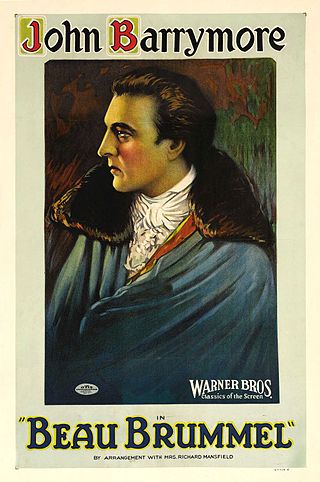
Beau Brummel is a 1924 American silent historical drama film starring John Barrymore and Mary Astor. The film was directed by Harry Beaumont and based upon Clyde Fitch's 1890 play, which had been performed by Richard Mansfield, and depicts the life of the British Regency dandy Beau Brummell.

Alexander Hamilton is a 1931 American pre-Code biographical film about Alexander Hamilton, produced and distributed by Warner Bros. and based on the 1917 play Hamilton by George Arliss and Mary Hamlin. It was directed by John G. Adolfi and stars Arliss in the title role. It follows the attempts of Hamilton to establish a new financial structure for the United States following the Confederation Period and the establishment of a new Constitution in 1787. It is preserved at the Library of Congress.

Disraeli (1921) is an American silent historical drama film directed by Henry Kolker and starring George Arliss. This film features Arliss's portrayal of Benjamin Disraeli. He had played the same role in the play Disraeli in 1911. Arliss also reprised this role in the 1929 sound film Disraeli.

The Terror is a 1928 American pre-Code horror film written by Harvey Gates and directed by Roy Del Ruth, based on the 1927 play of the same name by Edgar Wallace. It was the second "all-talking" motion picture released by Warner Bros., following Lights of New York. It was also the first all-talking horror film, made using the Vitaphone sound-on-disc system.

Daddies is a 1924 American silent romantic comedy film produced and distributed by Warner Bros. and directed by William A. Seiter. The film stars Mae Marsh and Harry Myers and survives today in 16mm format. It was transferred onto 16mm film by Associated Artists Productions / United Artists in the 1950s and shown on television.
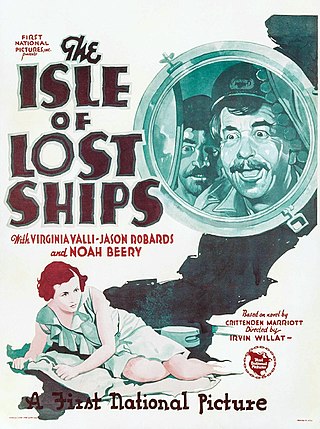
The Isle of Lost Ships is a 1929 talking film released in an alternative silent version with a Vitaphone track of effects and music. The picture was produced by Richard A. Rowland and distributed by Warner Bros. Irvin Willat was the director with Jason Robards Sr., Virginia Valli and Noah Beery Sr. in the leads. It is based on the 1909 novel The Isle of Dead Ships by Crittenden Marriott, and is also a remake of Maurice Tourneur's now lost 1923 classic of the same name. This film is preserved at the Library of Congress.
Disraeli is a 1916 British silent biographical film directed by Charles Calvert and Percy Nash and starring Dennis Eadie, Mary Jerrold and Cyril Raymond. The film was based on the 1911 play Disraeli by Louis N. Parker, which was adapted twice more, as a 1921 silent version and most famously in 1929, as an early sound film. It was made at Ealing Studios.

Disraeli is a biographical play by the British writer Louis N. Parker, which was first staged in 1911. The play was commissioned by the actor George Arliss who saw a portrayal of the Victorian British statesman Benjamin Disraeli as an ideal vehicle for his stage career. It was written in London during 1910. Parker suffered from writer's block at one point and received some assistance from Arliss. Parker included a subplot lifted from the 1839 play Richelieu by Edward Bulwer-Lytton which was later the subject of some controversy. He added a number of fictitious characters to add excitement and drama to the story. The real role of Lionel de Rothschild in the purchase was changed to that of the fictional banker Meyers. The play premièred at Wallack's Theatre in New York City on 18 September 1911.
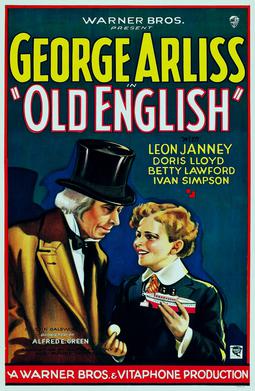
Old English is a 1930 American pre-Code drama film directed by Alfred E. Green and produced by Warner Bros. The film is based on the 1924 Broadway play of the same name by John Galsworthy. The film stars George Arliss, Leon Janney, Betty Lawford and Doris Lloyd. The film had its premiere August 21, 1930 at the Warner's Theatre in Hollywood.
